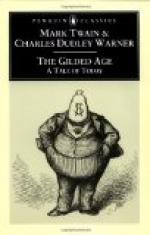“Ruth,” said he one day when he was getting to be quite himself, “I believe in it?”
“Believe in what?”
“Why, in women physicians.”
“Then, I’d better call in Mrs. Dr. Longstreet.”
“Oh, no. One will do, one at a time. I think I should be well tomorrow, if I thought I should never have any other.”
“Thy physician thinks thee mustn’t talk, Philip,” said Ruth putting her finger on his lips.
“But, Ruth, I want to tell you that I should wish I never had got well if—”
“There, there, thee must not talk. Thee is wandering again,” and Ruth closed his lips, with a smile on her own that broadened into a merry laugh as she ran away.
Philip was not weary, however, of making these attempts, he rather enjoyed it. But whenever he inclined to be sentimental, Ruth would cut him off, with some such gravely conceived speech as, “Does thee think that thy physician will take advantage of the condition of a man who is as weak as thee is? I will call Alice, if thee has any dying confessions to make.”
As Philip convalesced, Alice more and more took Ruth’s place as his entertainer, and read to him by the hour, when he did not want to talk —to talk about Ruth, as he did a good deal of the time. Nor was this altogether unsatisfactory to Philip. He was always happy and contented with Alice. She was the most restful person he knew. Better informed than Ruth and with a much more varied culture, and bright and sympathetic, he was never weary of her company, if he was not greatly excited by it. She had upon his mind that peaceful influence that Mrs. Bolton had when, occasionally, she sat by his bedside with her work. Some people have this influence, which is like an emanation. They bring peace to a house, they diffuse serene content in a room full of mixed company, though they may say very little, and are apparently, unconscious of their own power.
Not that Philip did not long for Ruth’s presence all the same. Since he was well enough to be about the house, she was busy again with her studies. Now and then her teasing humor came again. She always had a playful shield against his sentiment. Philip used sometimes to declare that she had no sentiment; and then he doubted if he should be pleased with her after all if she were at all sentimental; and he rejoiced that she had, in such matters what he called the airy grace of sanity. She was the most gay serious person he ever saw.
Perhaps he waw not so much at rest or so contented with her as with Alice. But then he loved her. And what have rest and contentment to do with love?




